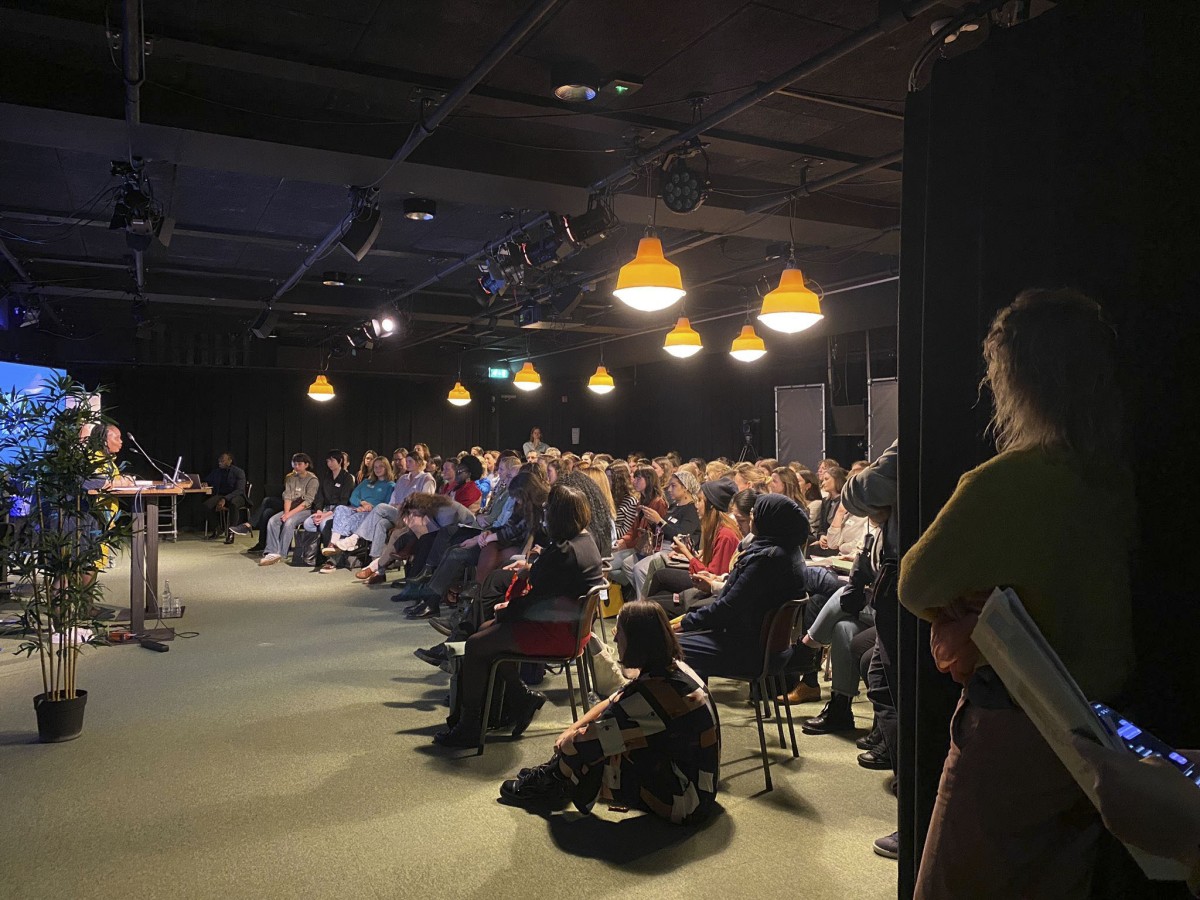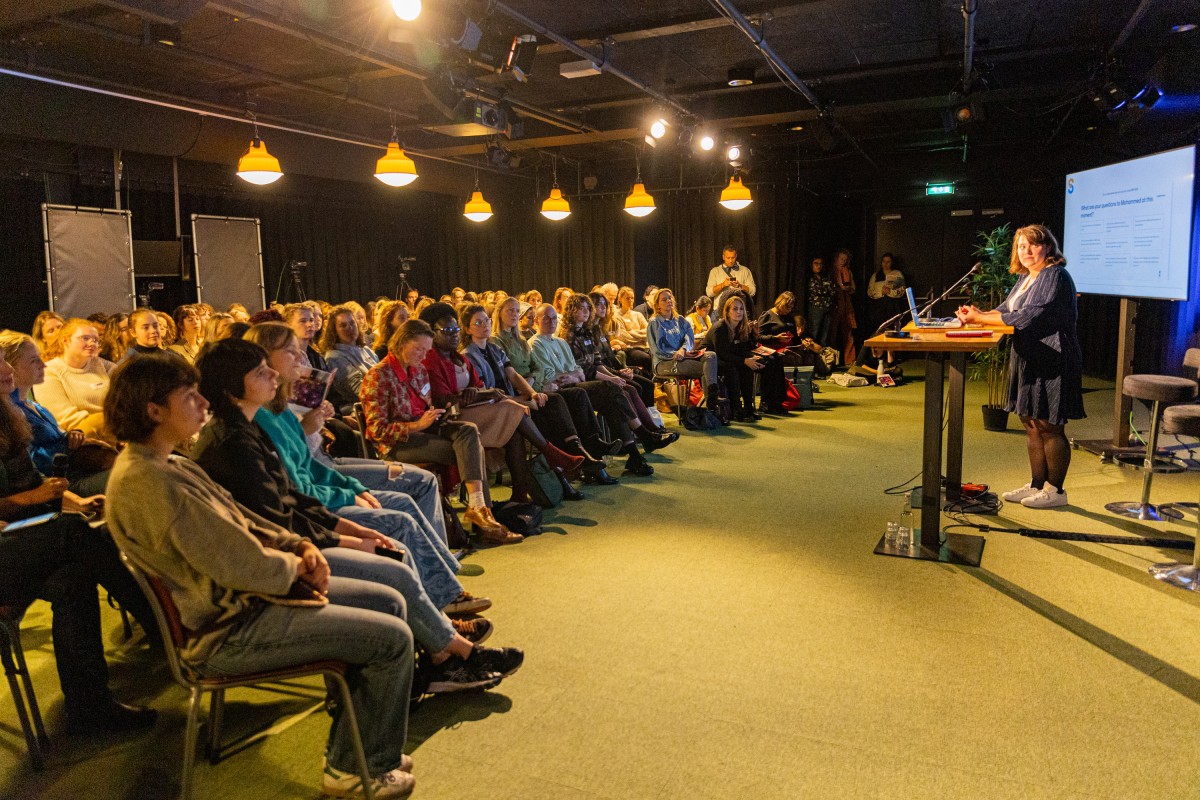Partos Innovation Festival: ‘Let people speak for themselves’
By Lula Ahrens
‘Telling the truth from the horse’s mouth, for the outside world to feel and understand.’ That’s the power of storytelling, according Simavi knowledge management and learning officer Diana Kazooba from Uganda. Mandiga’s Well, a (comic) book by Mohammed Hammie on the violence women encounter when fetching water, is a prime example of how storytelling can be a force for far-reaching social change. Simavi used it as a starting point for inspirational talks and discussions at Partos Innovation Festival on 14 October.

Partos Innovation Festival’s central theme on October 14th in Pakhuis de Zwijger in Amsterdam was inclusive civic power as an essential force for social change. A broad range of stakeholders shared their views on how to innovate and future-proof global development cooperation, with Simavi highlighting the crucial role of gender equality and feminist leadership in the quest for global access to water.
‘Simavi strengthens the voices of women and girls so they can speak for themselves and hold governments to account.’
Diana Kazooba, knowledge management and learning officer
Creative Storytelling for Social Change
At 7pm, when Mandiga leaves her village for her two-kilometre daily walk to the well down the forest, thugs attempt to rape her. When back home she is unable to cook due to the trauma, whereupon her husband beats her. Mandiga considers leaving him, but how will her community ever accept such a move?
This fragment is taken from the book Mandiga’s Well (2022) by Tanzanian journalist Mohammed Hammie, which has been shortlisted for the James Currey Prize for African Literature and the Quramo Writers’ Prize. Mandiga is a fictional name, but the woman she represents is real and the book has sparked a lively dialogue on the daily experiences of women in rural Tanzania. In a glorious twist of hope and success, Mandiga decides to confide in an empowered woman with links to a local NGO. She steps out of her comfort zone, connects with her fellow ladies and discovers that most share similar experiences, but kept quiet. Together, the women break their silence. They inform the authorities, after which the thugs are caught. What follows are discussions between the authorities, community leaders, women, children and men. The net result is not only a water source in the village which frees up time for women to do productive work, but above all broken taboos and female empowerment.

A deeper sense of urgency through storytelling
Diana Kazooba, Simavi knowledge management and learning officer who joined from Uganda to speak at Partos Innovation Festival, collaborated with Hammie during his writing process. The comic book version of Mandiga’s Well, which was published in collaboration with Simavi, has been certified as official teaching material and distributed among dozens of Tanzanian schools. ‘What connects people around the world are different arrays of emotions, fear and hope,’ Kazooba says. ‘The story of Mandiga’s Well creates a connection between the storyteller, the listeners [communities] and the main character. That connection recognises the ways in which we are the same and promotes understanding where we differ. That is the foundation of building stronger communities.’
Simavi wants to scale up its creative storytelling activities. ‘We work with activists in countries who record and write down people's stories,’ Simavi program manager digital & innovation and also speaker during the Partos Innovation Festival - Selma Hilgersom explains. ‘Seeing their own stories in writing can give people a deeper sense of urgency on what they want to achieve in life. Africa has much more of a storytelling culture than we do, so I’d like to point out that we’ve definitely not come up with a new concept.’
Kazooba knows the risks of carrying water from personal experience. ‘I know what it means to leave home at 6pm, walk down to the well – ours was also in the forest – and then carry twenty litres of water back home even though I was lucky to only be back in my village during school holidays. It’s tricky, it’s traumatising, I think it’s the worst any girl could go through. I used to see and hear hissing snakes. My cousin almost drowned in the open well one day; they managed to pull her out just in time. You never know what a girl encounters, because she may never tell. These traumas can have a life-long impact.’
‘The way we communicate on humanitarian situations must change,’ Kazooba says. ‘Let people speak for themselves. Storytelling for social change for me is telling the truth from the horse’s mouth, for the outside world to feel and understand. That way, we try to drive a connection between the two.’
Mandiga’s story is a prime example of how opening up can bring about life-changing transformations in communities where one would least expect it. ‘It also shows you the key problem may not be that people don’t have water; the problem is that people don’t have information. ‘That’s the root cause and the mindset we tackle.’

We need the men and the boys on board; we need everybody
Kazooba calls Hammie a hero and a feminist. ‘Look at his LinkedIn page. He’s always posting about women; women breastfeeding, women at the well. His contribution goes beyond publicly advocating for women as a man; Hammie changes the feminist perspective. In East Africa, men think of feminists as women who are too empowered, who do not respect men, who threaten men and thus create a new power imbalance. The way we portray feminism – should we even call it that? - should ideally be all of us respecting each other.’
Hammie’s book concentrates of both the female and the male involvement in the solution to Mandiga and her fellow women’s struggles, Kazooba explains. ‘We need the men and the boys on board; we need everybody.’
Mandiga’s Well has been translated from Swahili to English and is available on Amazon.
Partos Innovation Festival 2022
The ninth edition of the Partos Innovation Festival at Pakhuis de Zwijger in Amsterdam focused on inclusive civic power as an essential force for social change. It coincided with the opening of the of HER Film Festival organised by Cinetree and Simavi. NGOs, civil society leaders, researchers, social entrepreneurs, funders, government and the private sector put their heads together on 14 October to share new ideas and insights on how to accelerate and boost the impact of international development cooperation. Such ideas are urgently needed to combat alarming trends such as climate change, exclusion and injustice, and to foster a transition towards just, inclusive and sustainable development.
‘Let’s face it,’ Simavi managing director Dieneke van der Wijk said during a three-minute video message as part of the festival’s CEO PowerPitch Fest. ‘We live in a world designed by men, and men are often blind to the needs and rights of women and girls. The human right to water and sanitation is not about drilling wells, it is about gender equality. No real change is possible until that is recognised.’ A crucial requirement that should not be overlooked, Van der Wijk underlined, is NGO’s critical self-reflection and equal collaboration with partners to bring about the intended change.


